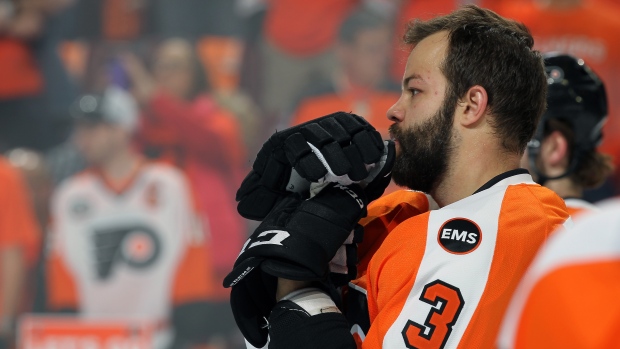Nov 17, 2017
Dreger Report: The issue with automatic suspensions
It's time the National Hockey League considered either standardizing automatic suspensions for malicious acts or removing them altogether, TSN Hockey Insider Darren Dreger writes.

A ho-hum week, the norm in a league that has become over sanitized, flipped to nasty on Wednesday night when the Detroit Red Wings and Calgary Flames turned the last six minutes of their game into a ‘70s flashback.
In spectacle alone, it was strangely entertaining. No one got hurt, both teams walked away with the swagger that comes from standing up for a teammate and what was once old was new again.
In the aftermath, Detroit's Luke Witkowski was given an automatic 10-game suspension under rule 70.6, which, among other things, forbids a player removed from the game from returning to the ice:
NHL Rule 70.6:
Any player who has been ordered to the dressing room by the officials and returns to his bench or to the ice surface for any reason before the appropriate time shall be assessed a game misconduct and shall be suspended automatically without pay for the next ten (10) regular League and/or Play-off games.
So, if 10 games is the standard based on a rule introduced years ago – perhaps in response to an era when brawls were commonplace – it's time the National Hockey League considered either standardizing automatic suspensions for other malicious acts or removing automatic suspensions altogether.
Witkowski’s actions didn’t warrant a 10-game suspension and it’s likely his punishment will be introduced as evidence at a future competition committee meeting or during CBA discussions that the rule needs to be revisited.
One suggestion is to lift the term “automatic” or allow the Department of Player Safety to overrule when applicable. Otherwise, fair or unfair, the league will be ridiculed for displaying inconsistency when doling out supplemental discipline regardless of the incidents and whether they’re related or not.
You can be sure the hockey world is watching how the league manages Radko Gudas's latest hockey crime very closely.
Gudas may be a great teammate and likeable man off the ice, but on the ice he can be a menace. He’s a repeat offender the Department of Player Safety has suspended twice and has tried to counsel in an effort to curb his recklessness.
His slash to the neck of Winnipeg Jets forward Mathieu Perreault on Thursday night earned the Flyers defenceman an invite to an in-person hearing and certain suspension. Given that Gudas was handed a six-game suspension for taking out Boston's Austin Czarnik just over a year ago, the punishment is expected to be severe.
Player Safety is doing its forensic study of the incident to first determine the level of wrong on the play. From there, Goudas’ past is brought into the equation. The outcome of the hearing and opinion of those involved will be digested by newly appointed department head George Parros before a final decision is made.
The end result, the slash to the back of Perreault’s neck, is what draws our attention and rightful sense of disgust, but Parros and company will dissect this incident far deeper than that.
For instance, they will look at the battle just before the slash. Perreault and Gudas were engaged in the corner, jostling for position and the puck before Gudas tripped Perreault with his stick on the upswing and then chopped the Jets forward on the downswing while seemingly looking up and forward at the play, and not down, perhaps further emphasizing intent.
Was it a vicious slash or careless use of his stick?
Undoubtedly, this will be some of the rationale used by Gudas, the Flyers and the Players' Association in arguing his defence.
What can't be argued is the history of the player and a growing rap sheet that puts Gudas at or near the top of the NHL’s list of most dangerous. Make no mistake; what he did to Perreault is undeniably dangerous. Remarkably, Perreault wasn't injured, which may also factor into the number of games Gudas is sidelined for.
Although the NHL's Department of Player Safety rightly assesses every incident individually, there are weeks like this one when we pay closer attention to the punishment dispensed by the department, along with the rationale presented in support of the decision.
Comparing the automatic 10 games Witkowski received for leaving the bench to what Gudas is about to receive may not seem fair to NHL brass or those involved in the process, but it's inevitable. In this case, the only way to avoid comparing “apples to oranges” is to ditch automatic suspensions and fully allow the Department of Player safety to do the job those involved have been hired to do.
Here are the existing criteria beyond the accumulation of game misconducts for automatic suspensions in the NHL:
- Three instigator penalties in one regular season
- Two instigator penalties in the playoffs
- A player who receives an instigator penalty in the final five minutes of regulation time or at any time in overtime
- Physical abuse of officials
- Leaving the bench for the purpose of starting an altercation
An in-person hearing traditionally carries with it a five-game or more suspension. Perhaps, for violent or dangerous acts five games is automatic when a major penalty is called with the understanding Player Safety can apply additional games based on repeat offender status and the severity of the infraction.
The point is, the NHL used the rulebook to nail Witkowski – not the discretion or work of the Department of Player Safety. Now the pressure is on Parros and his team to deliver a message to Gudas that is equally harsh.



